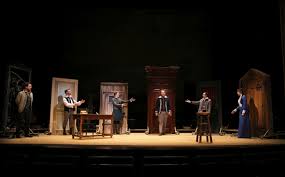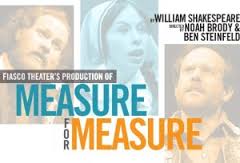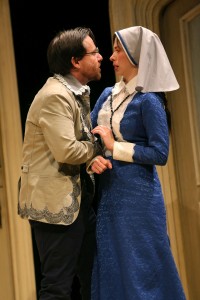It’s been standard practice recently in many smart recent Shakespeare productions to darken the plays. Some of my favorites in this mode include Propeller’s heartbreaking Winter’s Tale and Cheek by Jowl’s Macbeth and Tis Pity, but the list could go on. Fiasco Theater, by contrast, lightens dark things. I didn’t see their much-praised Cymbeline, but I loved their Two Gents last spring at Tfana. With small casts, fast action, clever doubling, and a canny sense for how to play the crowd, they’re one of the liveliest acts around.
Despite good reviews, I wasn’t sure what they would do with Measure for Measure, a deeply skeptical investigation of sin, corruption, and veniality in a shadowy Vienna that doubles as one Shakespeare’s least inviting portraits of Elizabethan London. How could a theater of laughter portray the Duke of dark corners? Could they capture Angelo’s conversion from saint to tormented libertine?
Heaven doth with us as we with torches do, / Not light them for themselves (1.1)
The answers, as I might have guessed, emerged from playfulness. In particular Andy Grotelueschen’s Duke was wonderfully addled, and he appeared himself to be just a little bit confused about why he was leaving Vienna and why returning. Angelo’s refusal to pardon Claudio clearly stunned the Duke-turned-Friar, and he had to scramble to re-order his domain. The Duke can be a cold or manipulative figure, but in this production he was wonderfully human and not very controlling. In reducing the Duke’s control, Fiasco’s production replicates the gambit of the play itself, which absents authority as a kind of test for its subjects. In this case, the Duke seemed testing himself as much as others. Escalus’s line, delivered to the disguised Duke himself, that the ruler’s major preoccupation was “especially to know himself” (3.2) never seemed less apt or more pointed.
Thoughts are no subjects. (5.1)
Into the vacuum created by the confused Duke strode the ethical athlete Angelo, wonderfully cross-cast with malaprop-dispensing Constable Elbow and played with gleaming life by Paul Coffey. Angelo’s desire to display his virtue and to be seen displaying it dominated his first interview with Emily’s Young’s persuasive Isabella. Perhaps because Fiasco’s house style includes careful attention to the audience, or because the very vocal audience members seated behind me oohed and ahhed over his changes of heart, Angelo’s sudden conversion to lust seemed rash and sudden, all the more so because the production never had the heart to condemn sexuality. Noah Brody’s Pompey and Emily Young’s second part as Mistress Overdone were more charismatic than seedy, and the wordplay about venereal disease never had much bite. Angelo’s awakening into sexual desire disrupted because it seemed so pleasurable; the one thing the virtuous acting-Duke could not endure, it seemed, was to smile.
Fitter time for that. (5.1)
My favorite character in the play is Lucio the light-bringer, a down-in-the-mouth Satan who bridged brothel and court, Claudio and Isabella, and in the end — much to his own surprise and dismay — uncowled the Duke. Ben Steinfeld, cross-cast as the gull Froth, played Lucio with verve and energy; when he enjoined Isabella to “assay the power you have” to persuade Angelo (1.4), he spoke for an ethic of play, in which more emotion, more intensity, more feeling is always better. I wasn’t sure if Steinfeld always hit Lucio’s heights — sometimes he seemed merely clownish rather than seductive — but he rose to his comic role undermining the disguised Duke in the final scene. His final lamentation that “Marrying a punk, my lord, is pressing to death, whipping, and hanging” (5.1) inverted his obnoxious Duke-teasing and brought the play’s comic conclusions home.
Death is a great disguiser. (4.2)
Does Fiasco’s lightness of tone diminish a dark play like Measure by turning its meditations on “mercy and mortality” (1.1) into something less consequential? I’m not sure. Fiasco’s tone went a long way toward redeeming the Duke, who normally I find either sinister or dull, depending on how essential he makes his machinations to the show. But a smiling Angelo is harder to make sense of. What if the shock of lust that he feels for Isabella’s purity is essentially the shock of pleasure? Might pleasure be as unsettling as power? Despite his own words, this Angelo never seemed frightening or brutal, even when he threatened Isabella. Angelo, along with Malvolio in Twelfth Night, probably represents Shakespeare’s portrait of the culture of conspicuous moral rectitude that would become 17c Puritanism — but perhaps Fiasco’s happier convert represents a way to play this character without the full weight of future history on his back?
Go to your bosom. (2.2)
Isabella’s a hard character for modern productions. Modern sexual mores make Pompey’s or Lucio’s bawdy joking seem clear-eyed, and the Duke’s last-minute proposal serves to give the do-gooder a self-interested motive. But can our pluralist and tolerant vision of the social world, with room enough for Mistress Overdone, Elbow’s hungry wife, and the varied sexual behaviors of Claudio, Lucio, and Pompey, venerate a young woman who wants nothing more than “more strict restraint” (1.4)? Emily Young’s Isabella warmed to the spotlight, exercising her power over Angelo before she knew what motivated it, rebuffing her brother in prison, negotiating with the disguised Duke. Could this newly forceful figure return to the sisters of St Claire?
The closing image of this play is a famous stage-crux: Isabella is given no lines in response to the Duke’s surprising proposal. I’ve seen an experimental production of this play at SUNY Purchase, in which every character was played by two actors. Isabella’s doppelganger was silent throughout, with duct-tape over her mouth as she pantomimed the erotic imagination she never speaks. At the Duke’s proposal, she ripped the tape off her mouth and screamed to the rafters.
But, like Fiasco’s Isabella, she never took the Duke’s hand. What can we say about this proposed marriage? I’m still not sure.


Leave a Reply